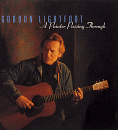| O Y S T E R B O Y R E V I E W 9 | |||
| R E V I E W | |||
| Kevin McGowin | |||
Lou Reed |
A Painter Passing Through Gordon Lightfoot. Reprise, 1998. (CD). Gordon Lightfoot's new album, his first of new material in over five years, is rather disappointing and unimaginative at first listen but grows on you into a collection of songs that are catchy and pleasant—that's if you're predisposed to like new work by Lightfoot anyway, which I admit that I am. I like this album a great deal more than I have his last couple of efforts, which although they certainly had their moments of intensity and melodic hooks were, for me, uneven and tired, lyrically stale and delivered in a breathless rasp: a voice far removed from the robust baritone of Lightfoot's prime and ravaged by alcohol, smoking, and God knows what else. But now he's back with another one, more even this time, the voice in good shape again, the songwriting more confident and the delivery more assured than it has been for over a decade. But the album is, ultimately, slight, just a minor achievement in and addition to the career of a man who, now approaching sixty, can and I think should be seen as one of the greatest folk singer-songwriters of his (or any other) generation. The album's fine for background listening while having friends over for a beer ("God, is that guy still alive?") but it fails to hit you in the gut or move your soul, as Lightfoot seems almost aware of and unapologetic for in the album's often self-referential lyrics. So what's the problem here? He can play, he can sing, he can write, and it's frustrating—one really wants to hook him up with Rick Rubin to produce a spare, honest, searing album that goes for the liver like he did in producing Johnny Cash's American Recordings a few years back. But Lightfoot co-produced his own album here, and what's wrong with and missing from it is so maddening because it's exactly what made Gordon Lightfoot so great in the first place. Lightfoot was a few years older than the average emerging music star of the time when he wrote and recorded most of the songs later to be collected on Gord's Gold in the 60s and early 70s, and like folk songs from the earliest ballads of recorded history, their theme was the past: the pain of it, the bittersweet longing for it, the sheer emotional impact of memory itself. And in his greatest songs, Lightfoot utilized the other timeless aspect of the folk idiom: the "speaker," who is not necessarily the singer himself but who presents the experience of a character of sorts. This classic and necessary element is found in the earliest Welsh ballads, in John Donne, Shakespeare, the Bible, Yeats, Robert Johnson, Billie Holiday—everywhere. And within this model Lightfoot found the shift, that past vs. present of the single individual voice developed in the octet/septet of the sonnet, and transposed it into the folk idiom for perhaps the first time in North American folk music: listen, for example, to "I'm Not Sayin'/Ribbon of Darkness" or "For Lovin' Me/Did She Mention My Name" from Lightfoot's greatest period. The power of the shift combined with the smoothness of its transition and the brutal, stark honesty of the lyrics renders a pronounced emotive power absent from "popular" music since the development of the classic British folk songs, and one so subtle as to be easily overlooked, just as Lightfoot has so often been overlooked by people who associate his work with the Muzak version of "Rainy Day People." As a Canadian and part Native American who grew up in a culture that was still in part sustained by oral tradition, one might see Lightfoot's work as a sort of distillation of cultures while still centered in a natural and logical progression in the history of classic folk music. Even if one doesn't, the fact remains that Lightfoot is still writing in the old folk idiom, but with much less power, intensity and immediacy than in his classic years. Here the narrator is mostly detached and seems to be addressing the listened from a place far removed from the riveting emotion of the older work, as in such songs as "Ringneck Loon": the melody's great but the lyrics suck, almost as trite as the "I'm not a guru" self-referencing posture of the title track. The best song on the album is its first, "Drifters," but it's also the album's worst recording—Lightfoot's voice and inflections are horrid, and I wonder why he didn't either do it in a different key or record it until it sounded good. But when he's good, you wish for Rick Rubin all the more. "Much to My Surprise" and "On Younge Street" are strong folk songs, but they feel overproduced—strange to say, isn't it, what with all the strings on the Gord's Gold songs—but here it shows, and it distracts. And having said all that, this man's still a phenomenal songwriter. And I'll tell you something I really feel: Gordon Lightfoot is doing exactly what he wants to be doing with these songs, and to measure them against his early work is not an entirely accurate comparison. He could still write songs that rip you apart, of loneliness and desperation and the ephemeral joys of just the weather or the sound of a voice. Or a memory. But he doesn't, and I doubt he ever will again—and can you really blame him? Once you've looked your demons in the face and kept on singing, maybe you just don't care to go back there again. | ||
|
- - - -
Other Gordon Lightfoot recordings mentioned in this review: Gord's Gold. | |||
